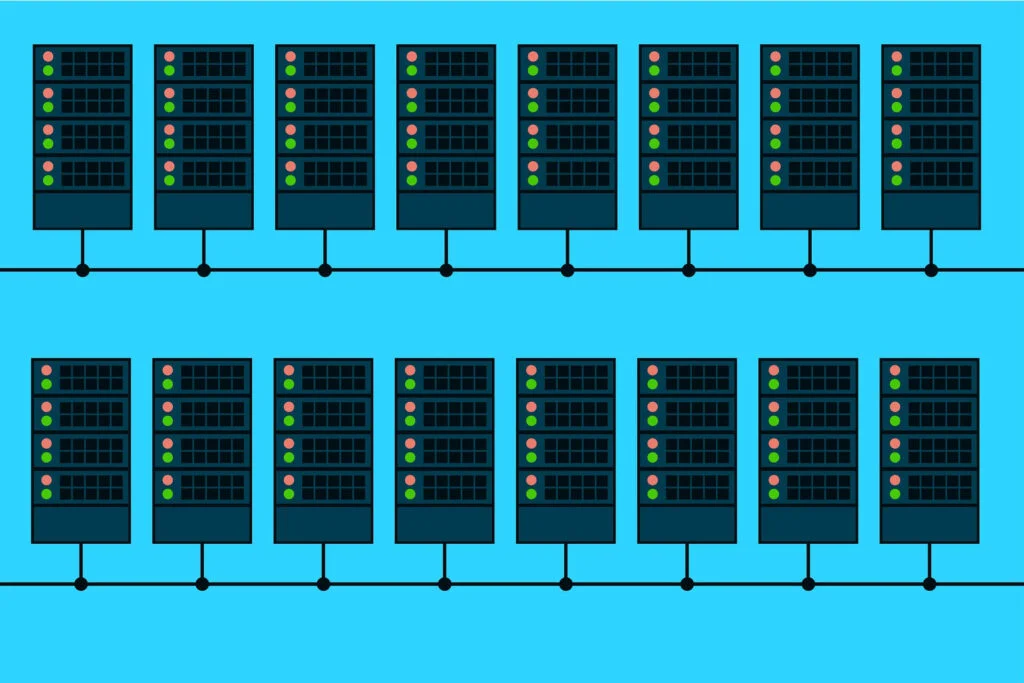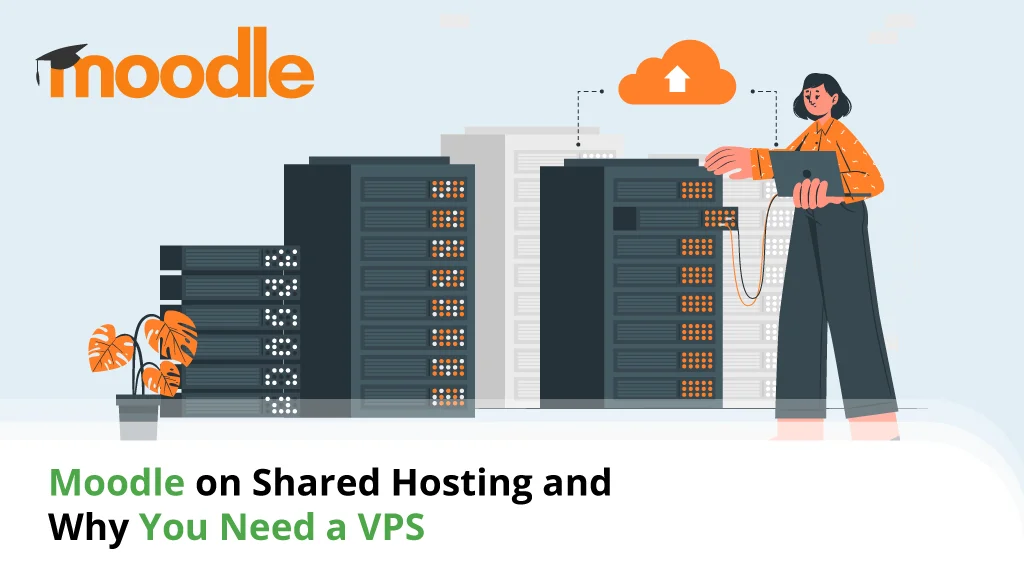
Choosing a hosting account may be a somewhat confusing experience for people who have just started work on their first-ever project. For example, they may see the different styles of hosting, and they may have absolutely no idea what the providers are trying to advertise. Even the more experienced users may be perplexed by the wide range of services and their features.
The difference between VPS hosting and cloud hosting, in particular, causes a lot of confusion among many people, and to help clear it up, we’ll now take a closer look at the two types of services.
Table of Contents:
- Overview of VPS Hosting
- VPS Hosting Pros
- Overview of Cloud Hosting
- Cloud Hosting Pros
- VPS vs. Cloud Hosting: How to Choose the Right Option for You?
- Switching Between Hosting Types
- Conclusion
- FAQ
Overview of VPS Hosting
VPS stands for Virtual Private Server. The purpose of this style of hosting is to bridge the gap between shared hosting and dedicated servers.
In a shared hosting scenario, you and hundreds of other users share the same server. Because so many people occupy the same machine, shared plans are very cheap, but there is a downside.
You all use the same resources at the same time. Traffic surges on one website can compromise the performance of the entire shared server and all the sites hosted on it. It’s hardly an ideal solution if you want to see consistent loading speeds while your project’s popularity grows.
A dedicated server is a much more powerful alternative. With it, the server’s hardware resources are available all the time, and they’re reserved especially for you. Unfortunately, the astronomical costs of setting up and maintaining an entire physical server mean that these solutions are extremely expensive.
VPS hosting is in the middle ground between shared and dedicated hosting. Once again, you have multiple accounts hosted on the same physical server. This time, however, each account has its own virtual machine.
Virtual machines give users an isolated environment. They’re not quite as powerful as the dedicated servers, but their hardware resources are at your disposal all the time, and you have your own dedicated IP.

VPS Hosting Pros
The popularity of VPS hosting plans has been growing rapidly, and this is hardly surprising given the advantages it offers.
Here are some of them:
- A cost-effective solution for many websites – before the emergence of VPS hosting, websites that had outgrown their shared accounts had no other choice but to switch to an expensive dedicated server solution. Because they’re more powerful, VPS plans are priced higher than the shared ones. However, since multiple VPSs can co-exist on the same physical server, they are nowhere near as costly as the dedicated hosting alternatives.
- Reliable performance – the VPS’s hardware resources are at your disposal all the time. You don’t need to worry about other users taking up too much power and slowing your website down.
- Easy scalability – hosting providers can easily change the configuration of your virtual server, which means that upgrades can be carried out with little or no downtime. Some hosts even offer the option of upgrading individual components for extra flexibility.
- Guaranteed email deliverability – In addition to the same hardware resources, shared servers also use the same IP address to send and receive emails. If one of the accounts on the shared server starts sending spam, the IP can quickly be blacklisted, leading to the loss of valuable email correspondence. With a VPS, you get your own IP. You are the only one using it, and you are solely responsible for its reputation.
- Ease of use – many people think that running an entire virtual server is too complicated. In reality, if you don’t feel confident enough to handle all the configuration and maintenance on your own, you can always get a managed VPS solution. With it, your host will take care of all the complicated technical tasks, and you will get a control panel that will help you manage your projects.

Overview of Cloud Hosting
The main difference between VPS hosting and cloud hosting lies in the infrastructure that delivers the hardware resources. Traditional services, including VPS hosting, relies on a centralized approach. Your VPS, dedicated server, or shared account all exist and run because a single physical machine is powered on and connected to the internet.
A cloud hosting account is similar to a VPS in that it isn’t affected by the performance of other websites hosted around it. However, cloud hosting relies on a distributed approach when it comes to providing computing power.
Instead of a single physical server, a cloud hosting account is powered by a cluster of machines that all work together to provide the CPU threads, memory, and disk space it needs. This same cluster is what people usually refer to as “the cloud.”
Although they are interconnected and work together, the physical machines that form your cloud don’t even need to be situated in the same data center. For redundancy and performance, many of the biggest cloud computing companies have clusters distributed across the globe.
If you purchase cloud services from them, you and the rest of the provider’s customers will be utilizing the same cloud cluster. This is what’s known as the public cloud. Alternatively, if you have the budget, you can create your own private cloud.

Cloud Hosting Pros
Most of the world’s popular websites and applications rely on cloud hosting, so there must be more than a few advantages to this type of service.
Here are some of them:
- Better uptime and availability – Unlike traditional hosting, the availability of the service doesn’t depend on the well-being of a single physical server. If the physical machine powering your virtual server experiences hardware failure, it will become inaccessible along with all the VPSs hosted on it. With cloud hosting, you have many other servers in the cluster taking up the slack.
- Unmatched flexibility – your cloud hosting account taps into a pretty much unlimited pool of resources, and you can add more power whenever you need it without any downtime whatsoever. The distributed model has also enabled some hosting providers to devise pay-as-you-go schemes where you pay only for the hardware resources and bandwidth you use.
- Full customization – ultimately, the provider decides what you’re allowed to do, but the setup makes cloud hosting accounts suitable for a wide range of different applications. You can do pretty much anything you want with them. You just need the technical skills to set everything up.
- High levels of security – some argue that distributing the service among multiple servers compromises its security, but the truth is, hosting providers do a lot to ensure your websites are well protected. Remember, however, that if you choose a self-managed service, a lot of the security configuration is left to you.
- A good option from a value-for-money perspective in some cases – cloud hosting tends to be pricier than traditional VPSs. However, due to its excellent flexibility, it can be a more cost-effective solution, especially for larger websites with more irregular traffic volumes.

VPS vs. Cloud Hosting: How to Choose the Right Option for You?
Both VPS and cloud hosting have more than a few distinct advantages over the traditional shared and dedicated servers. But how do you choose between them?
The two types of services have pros and cons that depend mainly on your specific project and what you’re trying to achieve. Let’s try to break down some of the most common scenarios where you’ll need to pick between the two options and see which ones you should go for.
Choose VPS Hosting When:
- You have outgrown your shared plan and want reliable performance, but your project is still developing, and your budget is limited.
- Your website is showing consistent, predictable traffic patterns.
- You need an easy-to-use hosting platform, and you’re happy to leave some of the server maintenance tasks to your host’s experts.
- You can accurately determine what sort of hardware resources you’ll need in the observable future.
Choose Cloud Hosting When:
- You have a relatively large global business that needs to perform well in all corners of the globe.
- Your website is prone to experiencing unexpected traffic spikes.
- You have the technical expertise to set up the hosting environment precisely the way you want it.
- You have the budget to cover higher hosting bills whenever your website attracts more visitors.

Switching Between Hosting Types
Many people are a bit apprehensive about the prospect of changing the type of hosting they’re using because they think that it may cause expensive downtime. The truth is, moving a website from one account to another needn’t be difficult, especially if the two platforms use compatible management tools.
Often, it’s a simple matter of creating a backup on the old server and restoring it at the new one. You can then check whether everything’s working before changing the domain’s nameservers and pointing it to the new account.
If you opt to upgrade to a VPS and you choose one of ScalaHosting’s fully-managed solutions, our technical support experts will carry out the migration for you. Be sure to get in touch with our sales specialists for more information.
Conclusion
The hosting industry has come a long way since the old days when website owners could only choose between cheap and slow shared plans and powerful dedicated servers that were way out of reach for most projects.
Thanks to cloud and VPS hosting, you now have a much wider range of options, and choosing the right one for you shouldn’t be that hard. You just need to know how the different styles of hosting work.
FAQ
Is VPS the same as cloud hosting?
No, it’s not. In a traditional VPS setup, your hosting provider sets up multiple virtual machines on a single physical server and then rents them out to individual clients. On a cloud hosting plan, you get an account that can tap into a pool of resources provided by a cluster of interconnected physical servers.
Is VPS a cloud service?
Virtual Private Servers can be put on a cloud infrastructure. However, in its more traditional implementation, VPS hosting is not a cloud service.
What is the difference between VPS and dedicated hosting?
With a dedicated server, you get an entire physical machine to yourself. You usually have root access, and all the machine’s hardware resources are at your disposal.
To create VPS hosting, providers partition a physical server into several virtual machines and lend them out to customers. You still have a fully isolated environment, but the plan is not quite as powerful. It’s also much more affordable since the hosting company can distribute the physical server’s resources among multiple accounts.
What is a VPS – Everything you need to know!



